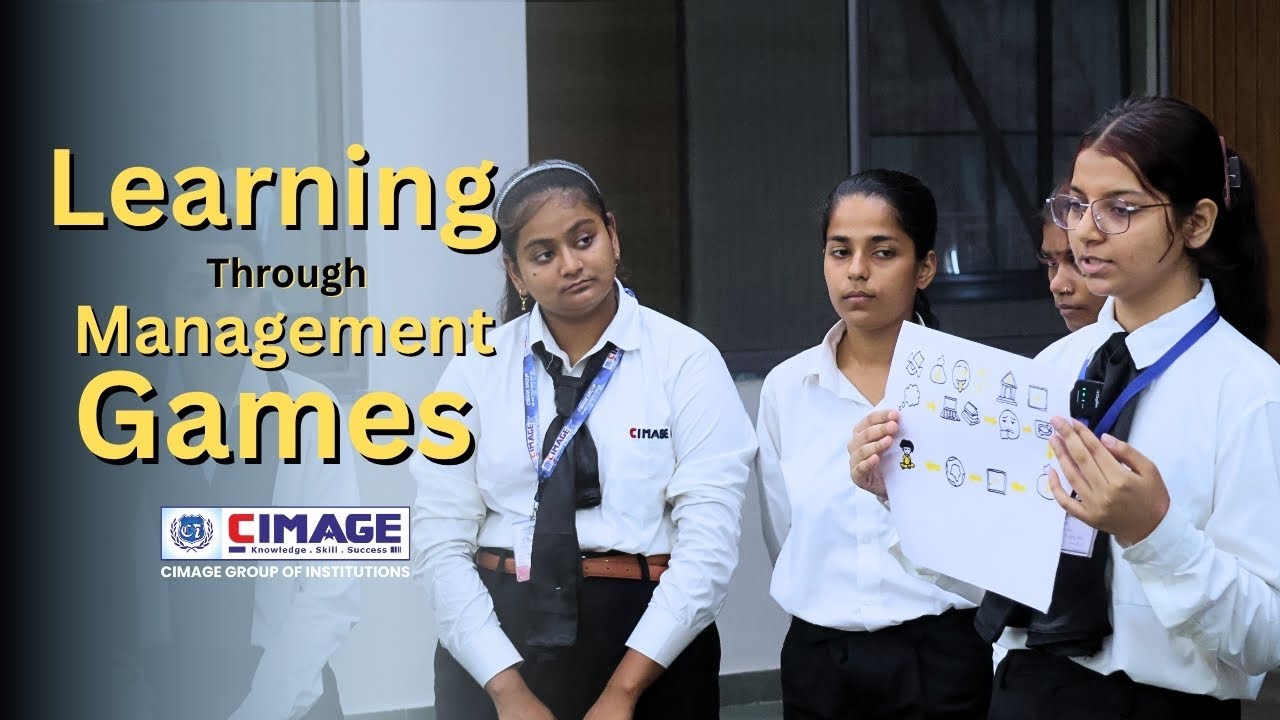
Emoji Tales: A Fun Management Game on Teamwork & Creativity
In today’s dynamic academic environment, theoretical knowledge alone is no longer sufficient to prepare students for the challenges of the real world. Recognizing this, CIMAGE College constantly innovates its teaching methods by integrating practical learning experiences alongside traditional classroom education. One such creative and impactful initiative was the recently organized Management Game titled "Emoji Tales: A Fun Management Game on Teamwork & Creativity."
This engaging activity was not just about emojis or storytelling — it was a powerful simulation of corporate scenarios, encouraging students to take ownership, collaborate efficiently, and think critically. The game proved to be a unique blend of fun, learning, leadership, communication, and strategic thinking, all wrapped in a creative framework.
The Concept: Learning Through Play
The foundation of “Emoji Tales” was built on a simple yet meaningful idea: use visual symbols (emojis) to express complex thoughts and construct a compelling narrative as a team. Each team was given a set of emojis and a thought-provoking theme — like “When I Become a Millionaire” — and asked to create a storyline, develop a team structure, distribute responsibilities, and present their vision creatively.
Although it may sound like a lighthearted activity on the surface, it was deliberately structured to mimic real-world business scenarios, emphasizing:
- Planning and goal-setting
- Task allocation and time management
- Communication and presentation
- Emotional intelligence and adaptability
The challenge required students to work under pressure, coordinate as a team, and deliver results with clarity and confidence.
Team Roles: Structured Like a Startup
Each participating team was asked to assign specific roles among their members to ensure efficient collaboration and responsibility-sharing. The primary roles included:
- Team Leader: Responsible for coordination and overall vision.
- Creative Head: In charge of designing the narrative using emojis.
- Energy Selector: Tasked with maintaining team motivation and enthusiasm.
- Timekeeper: Ensured that the team stayed on schedule.
- Presenter: Represented the team and delivered the final presentation.
This structure helped mimic an organizational hierarchy, allowing students to experience what it feels like to work in a startup or corporate setup. Each student was accountable for a specific function — encouraging ownership, discipline, and leadership.
Execution: Strategy Meets Creativity
The teams were given limited time to prepare. Despite the pressure, the excitement in the room was evident. Students were actively brainstorming, sharing ideas, giving constructive feedback, and rehearsing presentations.
One of the standout moments came from Team 3, whose presentation on the theme "When I Become a Millionaire" was both inspiring and technically sound. The speaker confidently explained the long journey towards success, highlighting the importance of big dreams, consistency, resilience, and giving back to society after achieving one’s goals.
Their story was emotionally rich, structured well, and connected deeply with the audience — proving that creativity and professionalism can coexist.
Key Learning Outcomes: Why Management Games Matter
The Emoji Tales game may have lasted just a few hours, but its impact on student development is long-term and multidimensional. Here's a breakdown of the key advantages:
1. Teamwork and Collaboration
Students learned how to work as a cohesive unit, even when there were differences in opinion. Effective communication, trust, and coordination were essential for success — all crucial skills in the workplace.
2. Leadership Development
By assigning roles like Team Leader and Creative Head, the game naturally brought out leadership qualities. Students had to take initiative, delegate tasks, and make decisions — much like they would in a professional setting.
3. Creative Problem-Solving
Using emojis as communication tools was not just fun but also intellectually stimulating. It forced students to think abstractly, connect visual elements with real-life experiences, and craft a meaningful message.
4. Public Speaking and Presentation Skills
Each team had to present their work in front of peers and faculty, which helped boost confidence, articulation, and clarity of ex
5. Time Management
The game was conducted within a strict time limit. Students had to manage brainstorming, content development, practice, and delivery — teaching them how to prioritize tasks and perform under deadlines.
6. Emotional Intelligence
By working in diverse groups, students encountered different personalities and communication styles. The game promoted empathy, patience, adaptability, and self-awareness — all key aspects of emotional intelligence.
7. Innovation and Fun Learning
The informal, gamified format helped reduce anxiety and opened up space for innovative thinking. It proved that learning can be both meaningful and enjoyable.
Faculty Insight: Learning Beyond the Classroom
CIMAGE faculty played a vital role in facilitating the activity while observing student behavior and team dynamics. According to one faculty coordinator:
“This game allowed us to see the students in a real-world simulation — how they think, react, and perform in groups. It was a valuable exercise not just for them, but for us as educators too.”
The game highlighted how students can take theoretical concepts like leadership, strategy, and communication, and apply them practically when given the right environment.
Student Reflections: Confidence Built, Bonds Strengthened
Many students described the activity as one of the most memorable experiences of their academic journey. One student said:
“I was nervous about presenting, but my team supported me. They gave me feedback, encouraged me, and made me feel capable. I’ve never spoken with such confidence before.”
Such reflections show the transformational impact of experiential learning. It’s not just about grades — it’s about shaping personalities.
Conclusion: Preparing Future Leaders, One Game at a Time
In the ever-evolving world of business and technology, students must develop more than academic excellence — they must learn to lead, collaborate, communicate, and innovate. Through initiatives like the Emoji Tales Management Game, CIMAGE reaffirms its commitment to holistic education, ensuring its students are not just job-ready but life-ready.
“Education is not the learning of facts, but the training of the mind to think.” – Albert Einstein
This activity was a clear testament to that philosophy — where learning was fun, impactful, and future-focused.














